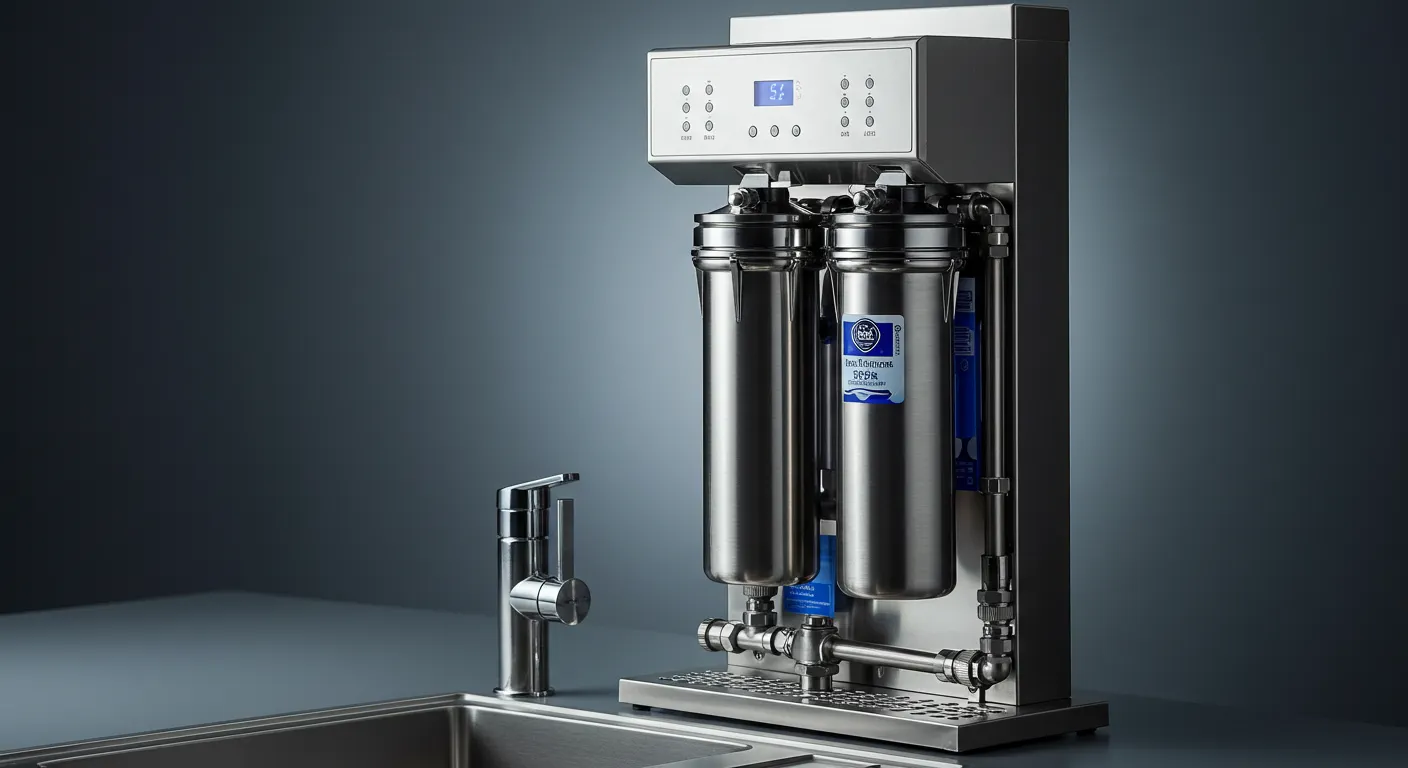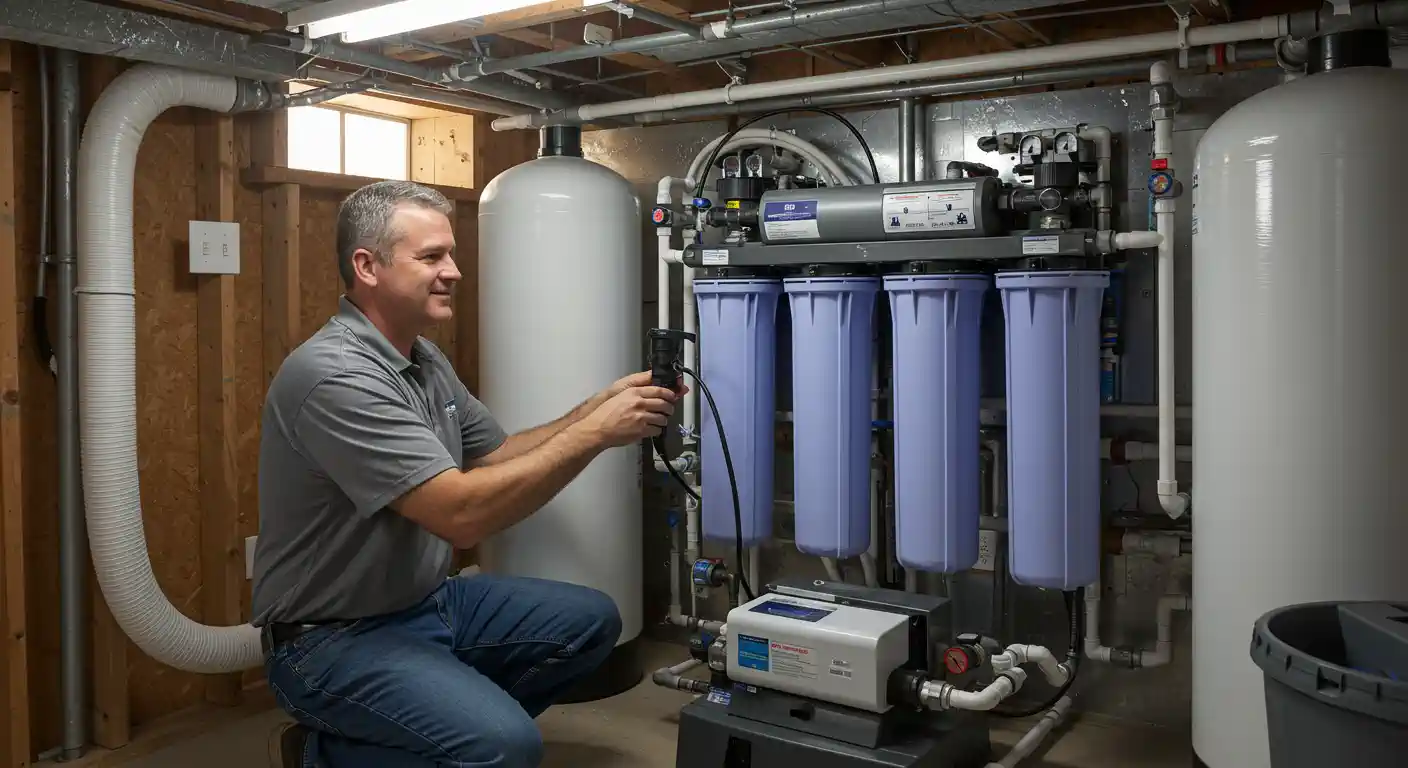Water Softener Installation in Franconia, VA
Hard water is a common challenge for homeowners in Franconia, VA, and throughout much of Northern Virginia. While seemingly harmless, the high mineral content, primarily calcium and magnesium, can lead to a variety of issues within your home's plumbing system and beyond. These dissolved minerals precipitate out over time, forming scale deposits that accumulate inside pipes, water-using appliances, and fixtures. This buildup can restrict water flow, reduce efficiency, and ultimately shorten the lifespan of valuable home infrastructure. Installing a water softener system is a targeted solution designed to mitigate these problems at their source, protecting your investment and improving your daily experience with water.

Signs of Hard Water in Your Home
Identifying the presence of hard water often starts with noticing specific signs around your home. You might see white, crusty buildup around faucets and showerheads, making cleaning difficult. Soap scum may stubbornly cling to bathroom surfaces and dishes, requiring more effort and product to achieve cleanliness. If your clothes feel stiff or faded after washing, or if your skin and hair feel dry and dull despite using moisturizing products, hard water could be the culprit. Appliances that heat water, like dishwashers, washing machines, and especially your Water Heater, can experience reduced efficiency and require more frequent Water Heater Repair or premature Water Heater Replacement due to scale buildup. Even minor issues like a dripping Faucet Repair & Installation can be exacerbated by mineral deposits interfering with internal components. Recognizing these indicators is often the first step towards seeking a solution like professional water softener installation.

How Water Softeners Work
A water softener system works through a process called ion exchange. Hard water enters the system, passing through a resin bed containing negatively charged beads coated with positively charged sodium or potassium ions. The calcium and magnesium ions in the hard water, which have a stronger positive charge, are attracted to the resin beads and swap places with the less strongly held sodium or potassium ions. As the water flows through, the hard minerals are captured by the resin, and the softened water, now containing sodium or potassium instead of calcium and magnesium, flows out into your home's plumbing. Periodically, the system undergoes a regeneration cycle where a brine solution flushes the accumulated hard minerals from the resin, sending them to a drain and recharging the resin with sodium or potassium ions, preparing it to soften more water.
Benefits of Installing a Water Softener
The benefits of installing a water softener system in your Franconia, VA home are extensive and noticeable in many aspects of daily life. From a practical standpoint, softened water helps prevent damaging scale buildup in your pipes and appliances. This protection can extend the life of your dishwasher, washing machine, and Water Heater, potentially saving you money on repairs and replacements over time. By preventing scale on heating elements, a water heater can operate more efficiently, potentially leading to energy savings. Cleaning tasks become easier and more effective; soaps and detergents lather better and rinse away cleanly, reducing the need for harsh chemicals and leaving surfaces, dishes, and clothes cleaner with less residue. Personal care also improves – soft water is gentler on skin and hair, helping them retain moisture and feel smoother and silkier. Colors in laundry can stay brighter, and fabrics feel softer. For homes experiencing specific water quality issues beyond hardness, a water softener can also complement other Water Filtration systems to achieve optimal water quality throughout the house.
What to Expect During Professional Installation
Professional water softener installation involves several key steps to ensure the system is correctly sized, located, and connected for optimal performance and longevity. The process typically begins with an assessment of your home's water usage, plumbing configuration, and incoming water hardness level. This allows professionals to recommend the appropriate size and type of water softener system for your specific needs. The ideal location for installation is usually near the main water supply line entry point into the house, often in a basement, garage, or utility room, where there is access to a power outlet and a drain.
During the installation, the main water line is typically shut off, and a section of pipe is carefully cut to allow the water softener unit to be plumbed into the system. Bypass valves are usually installed at this point, which allows the homeowner to isolate the softener for maintenance or in case of a system issue without interrupting water service to the house. The unit is then connected to the plumbing lines using appropriate fittings. A drain line is run from the softener (specifically from the control valve and potentially the brine tank overflow) to a suitable drain, such as a floor drain, laundry tub, or standpipe. An electrical connection is required to power the control valve, which manages the softening and regeneration cycles. Once all connections are made, the water supply is slowly turned back on, the system is purged of air, and the control valve is programmed according to the manufacturer's specifications and your water conditions. The professional installer will test the system to ensure it is operating correctly and often walk the homeowner through the basic operation and maintenance requirements, such as adding salt to the brine tank. Choosing professional installation ensures that the work is done correctly, meeting local codes and manufacturer requirements, and helps avoid potential issues like leaks or improper operation that could arise from DIY attempts.
Why Choose a Local Franconia Plumbing Team?
When considering water softener installation in Franconia, choosing a local, experienced plumbing team offers distinct advantages. A company with a deep understanding of the water quality challenges specific to the Northern Virginia region, including Franconia, is better equipped to recommend and install the most effective solution for your home. Experienced technicians are familiar with the diverse plumbing systems found in local properties and can navigate potential complexities during installation seamlessly. Their expertise ensures the system is sized correctly, installed according to best practices and code, and programmed for peak efficiency based on local water conditions. By choosing professionals, you benefit from their knowledge in selecting reliable equipment, ensuring proper connection to your existing Plumbing Repipe or standard pipes, and setting up the necessary drainage and electrical connections safely. They stand behind their work, providing peace of mind that your investment is protected.
Frequently Asked Questions About Water Softener Installation
Q. What is hard water?
A: Hard water contains a high concentration of dissolved minerals, primarily calcium and magnesium. While safe to drink, these minerals cause scale buildup, soap scum, and affect water-using appliances and personal care.
Q. How do I know if I have hard water in my Franconia home?
A: Common signs include mineral buildup (scale) on faucets and fixtures, soap scum that is difficult to remove, spots on dishes and glassware after washing, clothes that feel stiff or look dull, and dry skin or hair after showering. Reduced efficiency or frequent issues with appliances like your Water Heater can also indicate hard water.
Q. What are the main benefits of installing a water softener?
A: Benefits include preventing scale buildup in pipes and appliances, extending the life of plumbing and appliances, improved efficiency of water heaters, easier cleaning with less soap scum and residue, softer laundry, and gentler water for skin and hair.
Q. Where is a water softener typically installed?
A: Water softeners are usually installed near the main water line entry into your home, commonly in a basement, garage, utility room, or crawl space. The location needs access to power and a suitable drain.
Q. How long does the installation process take?
A: The duration of a water softener installation can vary depending on the complexity of your home's plumbing and the specific system being installed. However, a standard installation by experienced professionals can often be completed within a few hours.
Q. Does installing a water softener affect my water pressure?
A: A properly sized and installed water softener should not significantly impact your home's water pressure. Professional installers ensure the system is compatible with your plumbing and that connections are made correctly to maintain optimal flow.
Q. Do water softeners require maintenance?
A: Yes, most standard water softeners require you to periodically add salt (or potassium) to the brine tank. The frequency depends on your water usage and the size of the system. The system itself has a control valve that automatically manages the regeneration cycles. Some systems may also require occasional cleaning or filter changes depending on the model and incoming water quality.
Q. Is water softener installation a DIY project?
A: While it might seem possible, professional installation is strongly recommended. Proper installation requires plumbing knowledge, understanding local codes, correctly sizing the unit, ensuring proper drain and electrical connections, and programming the control valve. Incorrect installation can lead to leaks, system malfunction, or inadequate softening.
Q. Will a water softener remove other contaminants from my water?
A: Standard water softeners are designed specifically to remove calcium and magnesium ions (hardness minerals) through ion exchange. They do not typically remove other contaminants like chlorine, sediment, bacteria, or heavy metals. If you have concerns about other substances in your water, you might need additional Water Filtration or treatment systems.
Q. How long do water softener systems last?
A: With proper installation and maintenance, a quality water softener system can last for 10 to 15 years or even longer. The lifespan can depend on the system's quality, the hardness of your water, and how well it is maintained.
Q. Does softened water taste different?
A: Some people notice a slight difference in taste due to the presence of sodium or potassium ions, which replaced the calcium and magnesium. For most people, this difference is negligible or not noticeable. If taste is a concern, or if you are on a low-sodium diet, potassium chloride can often be used instead of sodium chloride, or a separate drinking water filter can be installed.
Trusted Brands.
We partner with industry-leading manufacturers to ensure your plumbing system runs on durable, high-quality parts built to last.


















Customer Testimonials
Cherry Blossom Plumbing has consistently provided top-notch service, ensuring every issue is resolved efficiently and professionally.

Service Areas
Proudly serving Arlington and the surrounding Virginia communities with fast, reliable plumbing solutions you can count on.




